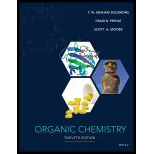
Interpretation:
The 3-D formula of the products when 1-methylcyclohexene reacts with the given reagents is to be written. The location of deuterium or tritium atoms in each case is to be designated.
Concept introduction:
Electrophiles are electron-deficient species, which has positive or partially positive charge. Lewis acids are electrophiles, which accept electron pair.
Nucleophiles are electron-rich species, which has negative or partially negative charge. Lewis bases are nucleophiles, which donate electron pair.
Substitution reaction: A reaction in which one of the hydrogen atoms of a hydrocarbon or a
Elimination reaction: A reaction in which two substituent groups are detached and a double bond is formed is called elimination reaction.
Addition reaction: It is the reaction in which unsaturated bonds are converted to saturated molecules by the addition of molecules.
Hydroboration-oxidation: An organic reaction in which the double bonds of
When
Want to see the full answer?
Check out a sample textbook solution
Chapter 8 Solutions
Organic Chemistry
- In each of the following reactions, two possible organic products can be formed. Draw both organic products in each case and then circle the one formed in greatest quantity in each case. HC (a) 1) NaH, 2) acid (b) CH,CH,OH (c) CH,CH,OH NH2 (d) Oarrow_forwardDraw Lewis structures for the following compounds, andpredict which member of each pair will form hydrogen bonds:(a) NF₃ or NH₃(b) CH₃OCH₃ or CH₃CH₂OHarrow_forwardA compound with formula C7H12O is treated with sodium borohydride in methanol to yield 2,2-dimethylcylopentanol. Write a reaction scheme showing the structures of the reactant, the reagents, and the product. Will the product be optically active? Explain.arrow_forward
- Draw a structural formula of an alkene that undergoes acid-catalyzed hydration to give each alcohol as the major product (more than one alkene may give each alcohol as the major product). (a) 3-Hexanol (b) 1-Methylcyclobutanol (c) 2-Methyl-2-butanol (d) 2-Propanolarrow_forwardBent (D) Trigonal pyramidal 5. A student wishes to prepare ethyl acetate from the reaction of ethanol and acetic acid. To be successful, this reaction requires (A) an acidic catalyst. (C) an oxidizing agent. (B) a basic catalyst. (D) a reducing agent. 6. Which alkyl halide reacts most rapidly with aqueous sodium hydroxide solution? (A) CH₂Cl (B) CH₂I (C) (CH3)3CCH₂Cl (D) (CH3)3CCH₂I 57. How many isomers are there with the formula C6H₁4?arrow_forward(a) Write the IUPAC names of the following compounds :(i) CH3CO(CH2)4CH3 (ii) Ph — CH = CH — CHO(b) Describe the following conversions in not more than two steps :(i) Ethanol to 3-Hydroxybutanal (ii) Benzoic acid to m-Nitrobenzyl alcohol(iii) Propanone to Propenearrow_forward
- Write Lewis structures and describe the molecular geometry at each carbon atom in the following compounds:(a) cis-3-hexene(b) cis-1-chloro-2-bromoethene(c) 2-pentyne(d) trans-6-ethyl-7-methyl-2-octenearrow_forward5B In the following reactions, mixtures of alkenes and ethyl ethers are formed. Draw their structures. Explain which is or are likely to be the main product(s) in each reaction. In case of formation of two isomers of alkenes, explain which is formed in greater proportion CH3 CH3 H3C-C H -Br CH3 EtOHarrow_forwardWhich products are formed when hydrobromic acid is added to (a) trans-2-hexene, (b) 2-methyl- 2-pentene, and (c) 4-methylcyclohexene, and how many regioisomers can be formed in each case?arrow_forward
- 18. The addition of H20 to ethene yields a molecule called: (a) ethanol (b) ethane (c) ethyne (d) ethylene glycolarrow_forward4 But-2-enal, CH₂CH=CHCHO, is a pale yellow, flammable liquid with an irritating odour. (a) But-2-enal exists as two stereoisomers. Draw skeletal formulae to show the structure of the two stereoisomers of but-2-enal. (b) (i) Describe a simple chemical test that would show that but-2-enal is an aldehyde. (ii) Explain why this test gives a different result with aldehydes than it does with keton (c) But-2-enal also reacts with sodium borohydride, NaBH4. (i) Identify the organic compound formed in this reaction. (ii) State the type of chemical reaction occurring. (d) Precautions must be taken to prevent but-2-enal catching fire. Construct a balanced equation for the complete combustion of but-2-enal, C₂HO.arrow_forwardChlorination of 2-butanone yields two isomeric products, each having the molecular formula C4H7ClO. (a) What are these two compounds? (b) Write structural formulas for the enol intermediates that lead to each of these compounds. (c) Using curved arrows, show the flow of electrons in the reaction of each of the enols with Cl2.arrow_forward
 Chemistry: Principles and ReactionsChemistryISBN:9781305079373Author:William L. Masterton, Cecile N. HurleyPublisher:Cengage Learning
Chemistry: Principles and ReactionsChemistryISBN:9781305079373Author:William L. Masterton, Cecile N. HurleyPublisher:Cengage Learning
